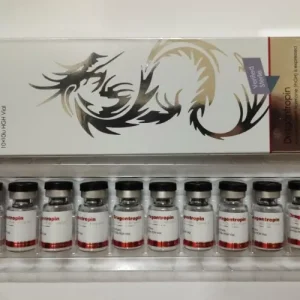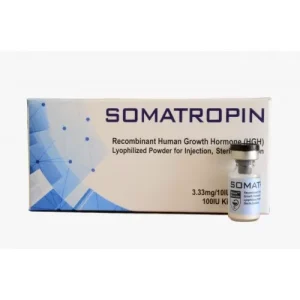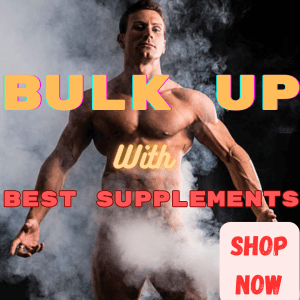Supplements
Whey Protein Explained: Isolate, Concentrate and Hydrolysate
If your goal is to get leaner muscles, it is essential to visit the gym 3 to 4 times a week. It is also needed to consume enough amount of protein. It is true that low-carbohydrates and high-protein are an essential element that can build lean muscles. Gym enthusiasts and bodybuilders are gulping down an adequate amount of protein through shakes. Dieters also gobble down protein bars to lose weight. They also replace their stored fats through lean muscles.
However, the whey protein supplements that can be found in the market today make it much difficult to choose the best one. Which do you think is the best for bodybuilders and nutritionists?
Protein and its Importance
Many people do not understand that protein is an essential component of the cells in the body. Nails and hair also consist of protein. The body also utilizes protein to repair and build tissues. This is essential especially when it comes to strength training.
In addition to that, protein is essential in building cartilage, muscles, bones, blood, and skin. This is classified as macronutrient which means that the physique requires huge amounts of protein. And as compared to carbohydrates and fat, the physique does not stock protein. Thus, it has no supply to get by the time that it needs a new supply.
Must Read: 4 Meals with Most Protein to Take If You are Body Builder
How Much is an Adequate Amount of Protein?

The body mainly requires a modest amount of protein for it to function well. Even based in the Health Services of the United States, the daily allowance for protein includes the following:
- Men aging Nineteen to Seventy Plus- Fifty-Six Grams Every Day
- Women aging Nineteen to Seventy Plus- Forty-six Grams Every Day
Benefits Brought By High Protein Supplements and Foods:

The following are the benefits expected from consuming high protein supplements and foods.
- Builds leaner muscles
- Reduces the loss of muscles
- Speeds up the Recovery Process Right After Exercise
- Curbs Hunger
- Helps the Body Maintains and Promotes Healthy Weight
What is Whey Protein?
 Whey protein is considered to be a fast protein. This means to say that it can be absorbed and digested easily. The amino acids will be delivered fast and easy to the muscles and to the bloodstream.
Whey protein is considered to be a fast protein. This means to say that it can be absorbed and digested easily. The amino acids will be delivered fast and easy to the muscles and to the bloodstream.
In this fast-paced society, it can be most observed that consumer products are turning into a better and bigger thing. It is also quite confusing differentiating between the whey protein supplements in health food stores.
Where It Comes From?
Whey protein is known to originate in dairy farms. The milk from dairy farms is moved to the manufacturing firm to start the cheese making procedure.
Special enzymes will usually be included in the milk. This will help separate the liquid whey and curds. And then, the whey is pasteurized and dried into milk powder and what is called now as whey protein.
Must Read: How Much Protein To Eat To Gain Muscle Mass
The Three Types:
There are three types of whey protein. They are each defined below for better understanding:
- Whey Protein Concentrate. This is known to go through less procedure. This also basically contains thirty to eighty-five percent of whey proteins. This also has differing amounts of carbohydrates and fat in lactone form. This contains different protein subfractions with health benefits.
- Whey Protein Isolate. This is very beneficial to people who do not have the tolerance to lactose or milk. This is also intended for those who have issues on digesting dairy. In addition to that, this contains over ninety percent protein with only 1% milk fat or lactose.

- Whey Protein Hydrolysate. This is produced through the use of pure protein sources. This is also predigested which means to say that the amino acids found in the concentrates and isolates are turned into amino acids. This will result in fast and efficient absorption. This will also be responsible in the release of the amino acids to the bloodstream. This now results to greater and better synthesis of muscle protein after exercise.

Consume Whey Protein After Weight Lifting and Training:

Whey protein is recommended to be used right after weight lifting and training. This helps maximize the fast and immediate recovery of the body.
An even higher level of insulin is created in the blood plasma. Just as insulin is considered to be an anabolic hormone, it really helps grow the lean muscles of the body.
Whey Isolates and Concentrates Available in the Form of Intact Proteins?

The majority of isolates and concentrates are available in the form of intact proteins. But, they could also be completely hydrolyzed. The whey hydrolysates are usually partially broken down by acid, enzymes, and heat. That is why they give out a bitter taste than whey isolate and whey concentrate.
Isolates and concentrates have already been known for their fast and rapid digestion rate. That is why you need to include a hydrolysate that digests a lot faster. This may not be approved by many for its taste. But, its extra cost is worth of the benefit it brings.
Conclusion:
If you are not lactose intolerant and you don’t worry about the fats and carbohydrates, whey protein concentrates will be the best choice for you. They are also far more economical choice than the other two types. But, whey protein in all types is beneficial for consumption or use. Try one of the best-selling whey proteins that can be found on the health food stores or market today!
Steroids
AOD-9604: The Fat-Burning Peptide Explained
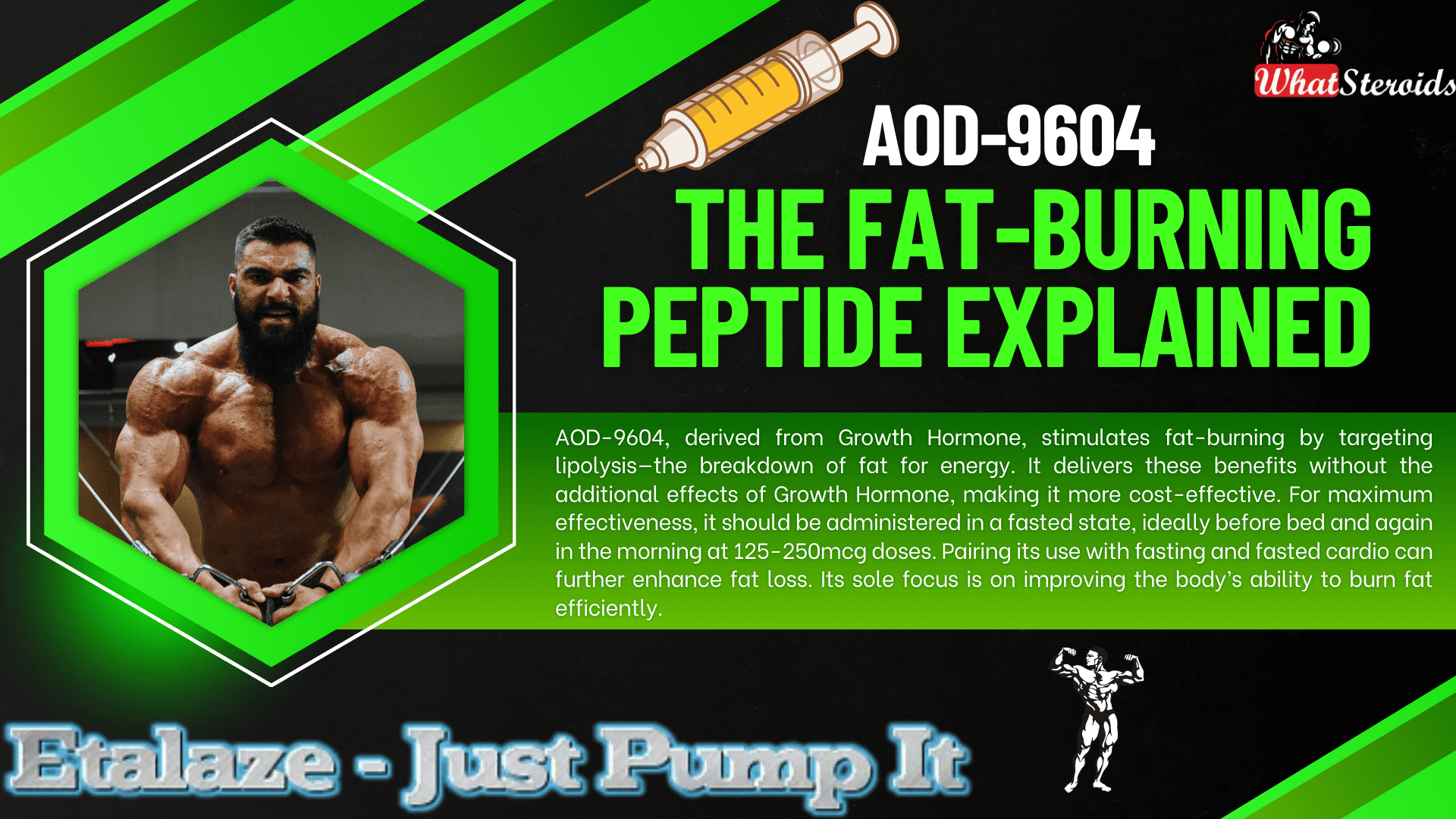
AOD-9604, along with the similar HGH Frag 176-191, is a peptide derived from Growth Hormone that includes only the amino acids in HGH responsible for stimulating fat breakdown, known as lipolysis.
This means that these peptides offer the fat-burning benefits of HGH without its other effects—whether beneficial or adverse—and come at a lower cost.
Related Article: Anavar Cycle for Men and Women
Lipolysis refers to the process where fat cells are broken down to be utilized as energy. AOD-9604 promotes accelerated fat loss by increasing the body's use of fat as fuel.
For optimal results, the peptides should be used in a fasted state. AOD-9604 and Frag 176-191 are most effective when administered at a dose of 125-250mcg before bedtime (at least 3-4 hours after eating) and in the morning at the same dose, followed by a fasting period of 3-4 hours, ideally combined with fasted cardio.
Check Out Dragontropin HGH 100 IU by Dragon Pharma
Similar Peptides with Fat-Burning Effect
Here’s a list of 10 peptides similar to AOD-9604, each with a brief description:
Ipamorelin: A growth hormone-releasing peptide (GHRP) that stimulates the natural release of growth hormone, promoting fat loss, muscle growth, and improved recovery without affecting other hormones like cortisol or prolactin.
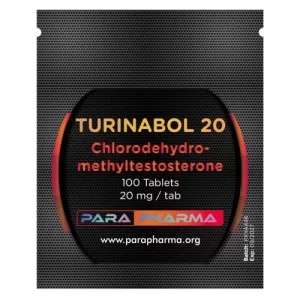 Click Here to Buy: Turinabol 20 by Para Pharma
Click Here to Buy: Turinabol 20 by Para Pharma
CJC-1295: A peptide that increases growth hormone and IGF-1 levels, aiding in fat loss, muscle gain, and improved sleep quality. It has a long half-life, making it convenient for users.
HGH Frag 176-191: A fragment of human growth hormone specifically designed for fat-burning. It targets adipose tissue without the broader effects of full-length HGH.
Tesamorelin: Known for reducing visceral fat, this peptide stimulates the release of growth hormone and is often used for weight management and metabolic health.
BPC-157: While primarily known for healing and recovery, BPC-157 can support fat loss indirectly by improving gut health and reducing inflammation.
Melanotan II: Originally developed for skin tanning, it also has appetite-suppressing properties, making it useful for weight management.
Thymosin Beta-4 (TB-500): Focused on healing and recovery, it can enhance physical performance and indirectly support fat loss through improved activity levels.
GHRP-6: A growth hormone-releasing peptide that boosts appetite and metabolism, aiding in muscle growth and fat loss.
Semaglutide: A GLP-1 receptor agonist that regulates appetite and blood sugar levels, making it effective for weight loss and metabolic health.
MK-677 (Ibutamoren): A growth hormone secretagogue that increases growth hormone and IGF-1 levels, promoting fat loss, muscle gain, and improved recovery.
List of Peptides With a Counteractive Effect Bodybuilders Must Avoid
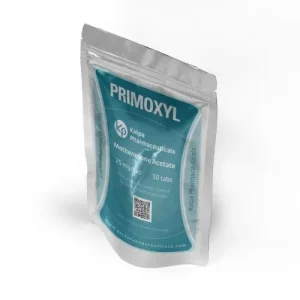 Click Here to Buy Primoxyl 25 by Kalpa Pharmaceuticals
Click Here to Buy Primoxyl 25 by Kalpa Pharmaceuticals
Some peptides can inadvertently lead to fat gain due to their effects on metabolism and appetite regulation. Here are a few that bodybuilders might want to avoid or use cautiously:
- GHRP-6 – While it stimulates growth hormone release, it also significantly increases appetite, which can lead to excess calorie consumption and fat gain.
- IGF-1 LR3 – This peptide enhances muscle growth but can also promote fat storage if not carefully managed with diet and training.
- MK-677 (Ibutamoren) – Though technically a growth hormone secretagogue rather than a peptide, it boosts GH levels but often leads to increased hunger and potential fat accumulation.
- CJC-1295 with DAC – While effective for muscle growth, its prolonged GH release can sometimes lead to unwanted fat retention if not paired with a strict diet
Overall
AOD-9604, derived from Growth Hormone, stimulates fat-burning by targeting lipolysis—the breakdown of fat for energy. It delivers these benefits without the additional effects of Growth Hormone, making it more cost-effective. For maximum effectiveness, it should be administered in a fasted state, ideally before bed and again in the morning at 125-250mcg doses. Pairing its use with fasting and fasted cardio can further enhance fat loss. Its sole focus is on improving the body’s ability to burn fat efficiently.
Read More: How Much Do You Know About B-AET? A Fat Burner You’ve Been Missing
Bodybuilding
Understanding Trenbolone-Induced Cough (“Tren Cough”)
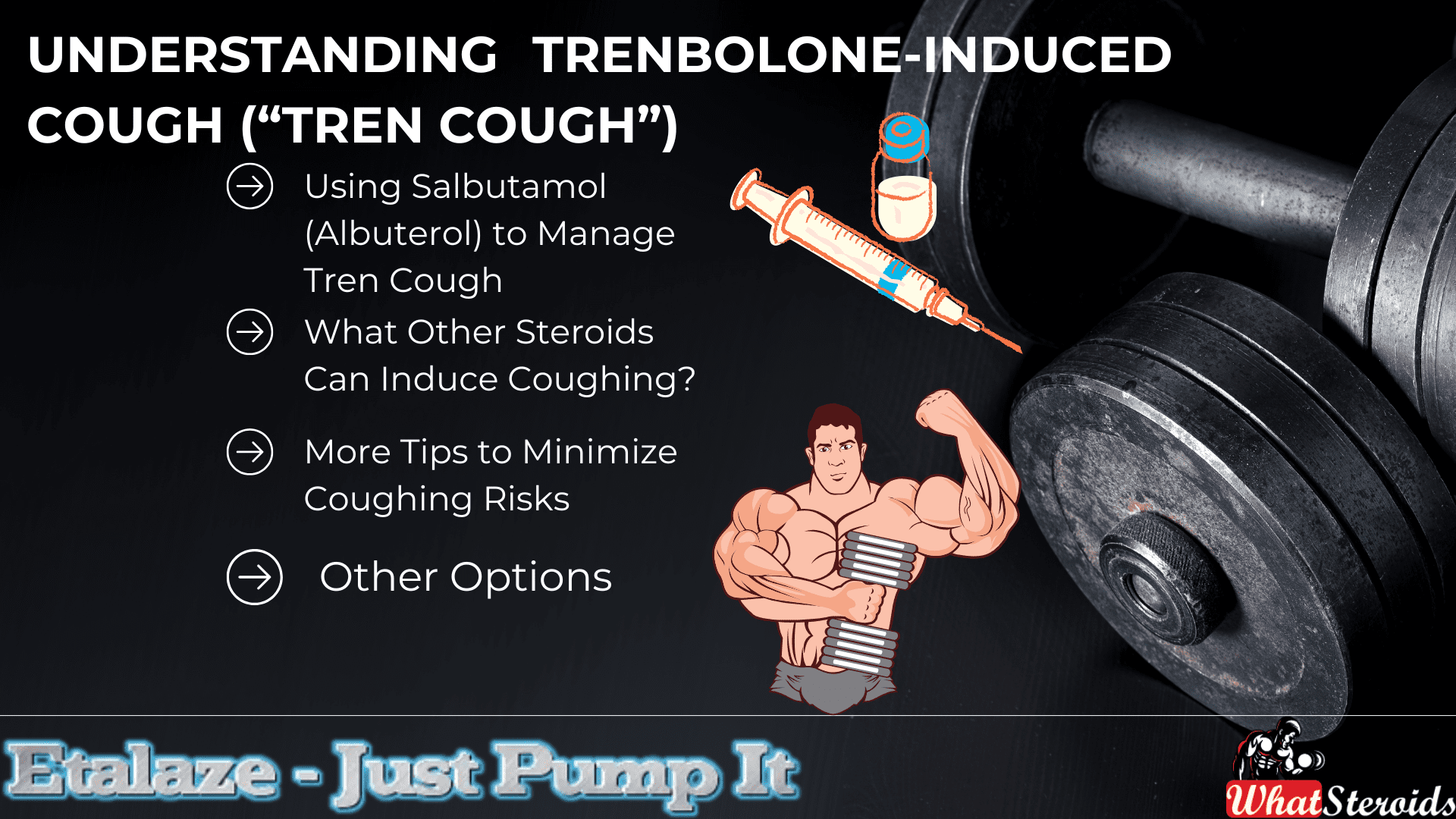
Trenbolone, a potent anabolic steroid, can sometimes cause “tren cough”—a sudden and intense coughing episode shortly after injection. Although not exclusive to Trenbolone, it is more commonly associated with this substance due to its highly irritant nature.
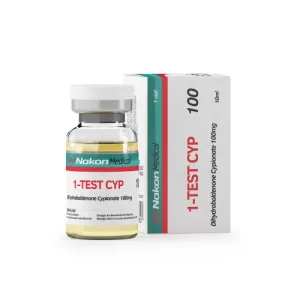 Click Here To Buy 1-Test Cyp 100 by Nakon Medical
Click Here To Buy 1-Test Cyp 100 by Nakon Medical
Mechanisms Behind Tren Cough
Solvent and Carrier Irritation
Trenbolone formulations often include volatile solvents like benzyl alcohol or benzyl benzoate, which may irritate lung tissues when absorbed quickly into systemic circulation.
Prostaglandin Release
Trenbolone promotes increased production of prostaglandins, particularly PGF2α. This compound triggers contraction in the smooth muscles of the lungs, leading to bronchoconstriction and coughing.
Micro-Oil Embolism
Tiny oil droplets from an injection can reach capillaries and travel to the lungs, causing mild embolic reactions that lead to temporary oxygen deprivation and coughing.
Histamine and Mast Cell Activation
For some individuals, Trenbolone triggers histamine release and mast cell activation, mimicking an allergic response and causing bronchospasms and cough reflexes.
Related Article: Best Syringes for Steroid Injection on Amazon
Using Salbutamol (Albuterol) to Manage Tren Cough
- Salbutamol, a widely-used β2-adrenergic receptor agonist, can alleviate tren cough symptoms by:
- Relaxing bronchial muscles, easing spasms that cause coughing.
- Inhibiting prostaglandin effects, reducing bronchoconstriction associated with PGF2α.
- Opening airways, preventing severe respiratory restrictions in susceptible individuals.
Application Methods
Inhaler (Optimal)
Take 1–2 puffs of salbutamol (100–200 mcg) 5–10 minutes before a Trenbolone injection. If coughing occurs afterward, additional puffs can swiftly resolve the issue.
Oral Tablets (Moderate)
Consuming 2–4 mg tablets 30–60 minutes before injection offers slower, longer-lasting relief but may be less effective than inhalation methods.
Nebulizer (Severe Cases)
For individuals with frequent episodes, nebulized doses of 2.5 mg salbutamol can provide substantial relief.
Preventive Measures to Reduce Tren Cough Risk
- Inject slowly to minimize systemic absorption and irritant effects.
- Split doses to lower reaction severity with smaller quantities.
- Opt for ventrogluteal injection sites, which have fewer blood vessels, reducing oil embolism risk.
- Choose lower-concentration solutions to lessen irritation, as higher concentrations (e.g., Tren Ace 200 mg/ml) are more likely to provoke reactions.
What Other Steroids Can Induce Coughing?
Here's a curated list of peptides, SARMs, and PEDs that may potentially cause coughing or respiratory irritation in bodybuilders and fitness enthusiasts:
Peptides
IGF-1 LR3 (Insulin-like Growth Factor): Known for its anabolic effects, IGF-1 LR3 can occasionally cause mild respiratory irritation due to systemic absorption.
TB-500 (Thymosin Beta-4): While rare, improper injection techniques or high doses may lead to transient coughing episodes.
GHRP-6 (Growth Hormone-Releasing Peptide): This peptide can stimulate histamine release, potentially leading to bronchospasms and coughing.
SARMs (Selective Androgen Receptor Modulators)
RAD-140: (Testolone) Some users report throat irritation or coughing, often attributed to solvents used in liquid formulations.
YK-11: Known for its myostatin-inhibiting properties, YK-11 may cause mild respiratory discomfort in sensitive individuals.
LGD-4033 (Ligandrol): Though uncommon, some users experience coughing due to carrier solvents or allergic-like reactions.
PEDs (Performance-Enhancing Drugs)
Boldenone Undecylenate (Equipoise): This injectable steroid can cause “Equipoise cough,” similar to tren cough, due to oil embolism or irritant solvents.
Testosterone Suspension: The water-based formulation may lead to coughing episodes if injected improperly or absorbed rapidly.
Nandrolone Decanoate (Deca-Durabolin): While less common, coughing can occur due to histamine release or systemic irritation.
More Tips to Minimize Coughing Risks
- Use proper injection techniques to avoid embolic reactions.
- Opt for lower-concentration solutions to reduce irritant effects.
- Consider antihistamines or bronchodilators for individuals prone to respiratory sensitivity.
Read More: Joint Stiffness: How to Manage It While on AAS
Are There Alternatives to Cough-inducing Steroids?
Here are some alternatives to cough-inducing steroids that can provide similar anabolic effects while minimizing respiratory irritation:
Peptides
IGF-1 LR3 (Insulin-like Growth Factor)
Promotes muscle growth and recovery without the irritant properties of certain steroids.
TB-500 (Thymosin Beta-4)
Enhances tissue repair and reduces inflammation, making it a safer option for recovery.
BPC-157 (Body Protection Compound)
Known for its healing properties, it supports muscle repair and joint health.
SARMs (Selective Androgen Receptor Modulators)
RAD-140 (Testolone)
Provides significant muscle-building effects with fewer systemic side effects compared to traditional steroids.
LGD-4033 (Ligandrol)
Boosts lean muscle mass and strength without the risk of respiratory irritation.
MK-677 (Ibutamoren)
Stimulates growth hormone release, aiding in muscle growth and recovery.
Natural Alternatives
Turkesterone
A plant-based ecdysteroid that supports muscle protein synthesis and recovery.
Ecdysterone
Another natural compound that mimics anabolic effects without the harsh side effects.
Creatine Monohydrate
Enhances strength and muscle mass through improved energy production during workouts.
Other Options
Human Growth Hormone (HGH)
Promotes muscle growth and fat loss, though it requires careful monitoring due to potential side effects.
Testosterone Boosters
Natural supplements like D-Aspartic Acid or Tribulus Terrestris can help optimize testosterone levels for muscle growth.
SARMs Alternatives
Legal and safer versions of SARMs are available, offering similar benefits without the risks associated with traditional SARMs.
Overall
We have explored the phenomenon of "tren cough," a sudden, intense coughing episode often caused by Trenbolone injections due to factors like solvent irritation, prostaglandin release, micro-oil embolism, or histamine activation. Preventive measures such as using salbutamol (via inhaler, oral tablets, or nebulizer), injecting slowly, splitting doses, and opting for lower-concentration solutions were highlighted.
Additionally, alternative compounds to tren cough-inducing steroids were discussed, including peptides like IGF-1 LR3 and TB-500, SARMs such as RAD-140 and LGD-4033, and natural options like Turkesterone, ecdysterone, and creatine. These alternatives provide anabolic effects while minimizing respiratory side effects. The conversation also underscored the importance of proper injection techniques and thoughtful compound selection to reduce risks.
Steroids
Creatine vs Myostatin: An Expert’s Analysis
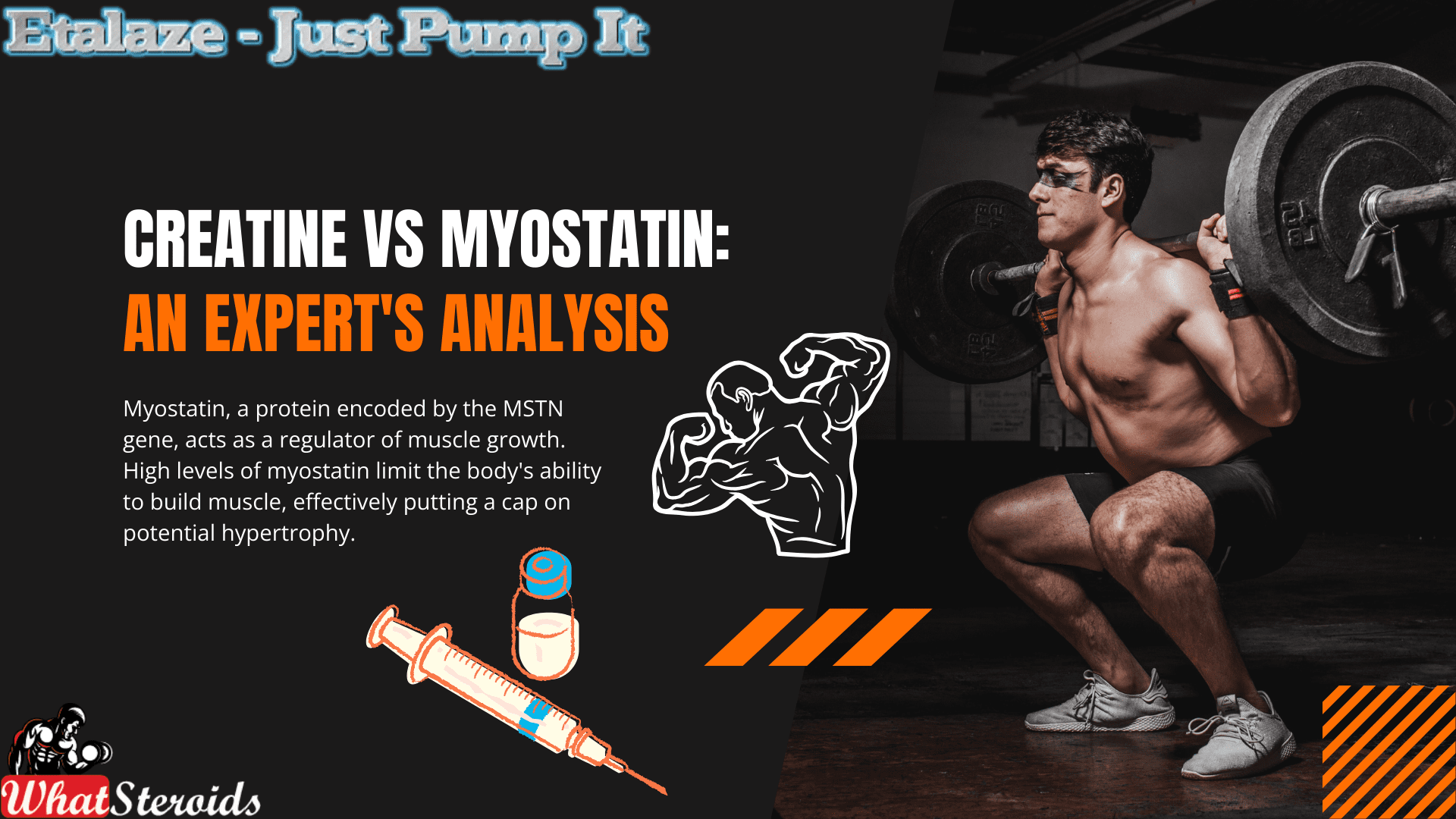
Myostatin, a protein encoded by the MSTN gene, acts as a regulator of muscle growth. High levels of myostatin limit the body's ability to build muscle, effectively putting a cap on potential hypertrophy. Inhibiting myostatin has become a focal point for bodybuilders looking to break through plateaus and achieve significant muscle gains. The question is: can creatine, a popular and widely available supplement, help in this regard?
Medical History of Myostatin and Creatine
Myostatin and creatine, while popular now in the bodybuilding world, have their roots in entirely different contexts:
Myostatin: Natural Muscle Growth Regulator
Myostatin is a protein originally identified for its role in regulating skeletal muscle mass. In nature, it serves an evolutionary purpose: by limiting muscle growth, it conserves energy, ensuring that animals (and humans) don’t expend unnecessary resources maintaining excessive muscle tissue. This was especially important in the wild, where energy efficiency could mean the difference between survival and extinction.
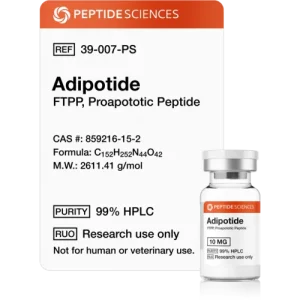 Check Adipotide (FTPP) 10mg by Peptide Science
Check Adipotide (FTPP) 10mg by Peptide Science
In the medical field, research into myostatin has focused on its role in muscle-wasting diseases. Scientists are exploring ways to inhibit myostatin to treat conditions like muscular dystrophy, where excessive muscle loss impairs quality of life. This therapeutic potential is where the idea of myostatin inhibition first began—long before bodybuilders latched onto the concept.
Creatine: Energy and Medical Applications
Creatine was originally studied for its role in energy metabolism. It’s a naturally occurring compound stored in muscle cells and plays a critical part in replenishing ATP (adenosine triphosphate), the body’s primary energy currency during short, high-intensity activities.
Before becoming a bodybuilding staple, creatine gained recognition in medical and sports science for its ability to improve athletic performance and assist with recovery. Furthermore, in medicine, creatine was investigated for neurological conditions such as Parkinson’s disease, Huntington’s disease, and muscular dystrophy, given its potential to improve muscle function and brain energy metabolism.
In the sports world, it was initially adopted by sprinters and weightlifters in the 1970s and 1980s for its energy-enhancing benefits.
Both myostatin and creatine have found new life in bodybuilding circles, demonstrating how discoveries in natural physiology and medical science can lead to transformative applications in fitness.
Benefits of Creatine as a Myostatin Inhibitor
Muscle Growth Potential: Research suggests that creatine, when paired with intense resistance training, may inhibit myostatin to a degree, fostering an environment for enhanced muscle growth.
Improved Exercise Performance: Creatine is well-known for its ability to increase ATP production, translating to better performance during high-intensity activities.
Versatility Across Fitness Levels
Whether you're a beginner or an advanced athlete, creatine offers benefits that complement various stages of muscle-building.
Must Read: A New Caffeine? What You Need to Know about Teacrine
Affordability and Accessibility
Compared to specialized myostatin inhibitors like YK-11 and ACE-031, creatine is significantly more affordable and accessible.
Side Effects of Creatine
While generally safe for most individuals, creatine supplementation does come with some potential side effects:
Water Retention: Some users experience bloating due to increased water retention in muscle cells.
Gastrointestinal Issues: High doses may lead to stomach upset or diarrhea.
Kidney Concerns: Although rare, prolonged excessive use could strain the kidneys, particularly in individuals with pre-existing conditions.
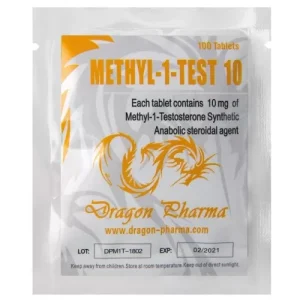 Buy Methyl-1-Test 10 -100 tabs by Dragon Pharma
Buy Methyl-1-Test 10 -100 tabs by Dragon Pharma
Alternatives to Creatine for Myostatin Inhibition
YK-11: A synthetic myostatin inhibitor derived from SARMs, offering more potent results but accompanied by more significant risks.
ACE-031: A peptide that directly inhibits myostatin, though it remains in experimental phases and is not legally approved in many regions.
Natural Alternatives
Follistatin-rich Foods: Eggs and dairy products may have natural myostatin-inhibiting properties.
Resistance Training: Intense and consistent weightlifting alone can naturally lower myostatin levels.
Where to Buy Creatine
Creatine is readily available worldwide. It can be purchased from:
Local Pharmacies and Nutrition Stores: Ideal for trusted and immediate access.
Online Platforms: Websites like Amazon, iHerb, or bodybuilding-specific stores offer a variety of brands and formulations.
Supplement Brands: Well-established brands such as Optimum Nutrition, MyProtein, and Cellucor often carry high-quality creatine.
Legality of Myostatin Inhibitors
Creatine: Creatine is completely legal and widely accepted as a dietary supplement.
YK-11 and ACE-031: These compounds exist in a legal gray area in many countries due to their experimental nature and potential risks. It's essential to research local laws before considering these options.
Best Stores and Suppliers
For reputable products, consider:
Transparent Labs: Known for purity and transparent labeling.
Optimum Nutrition: Offers pharmaceutical-grade creatine monohydrate.
Bulk Supplements: A great choice for bulk buyers seeking affordability and quality.
Our Advice to Bodybuilders
Always consult with a healthcare professional before starting any new supplement, especially if you are already using AAS or other advanced compounds.
Prioritize a balanced diet and consistent exercise routine. Supplements like creatine work best as part of a holistic approach to fitness.
Stay hydrated while using creatine to minimize water retention side effects and support kidney health.
Related Article: Best Syringes for Steroid Injection on Amazon
Overall
While creatine may not be as potent a myostatin inhibitor as advanced compounds like YK-11 or ACE-031, its affordability, safety, and accessibility make it a valuable addition to any bodybuilder's supplement stack. By leveraging its benefits alongside proper training and nutrition, you can maximize muscle growth and overcome plateaus, regardless of your fitness level.
-

 Steroids2 years ago
Steroids2 years agoShavers and Other Body Grooming Equipment for Bodybuilders In 2023
-

 Steroids2 years ago
Steroids2 years agoChatGPT and Other Avenues to Find Great Bodybuilding Coaches
-

 Steroids2 years ago
Steroids2 years agoBest Oil Recommendations Before Competition for Subtle Shimmer
-

 Steroids2 years ago
Steroids2 years agoPowerlifting Vs Power Building: Find Out the Big Difference and When to Shift Between the Two
-

 Nutrition2 years ago
Nutrition2 years agoEverything Nutritional Food: What’s Too Much Or Too Little
-
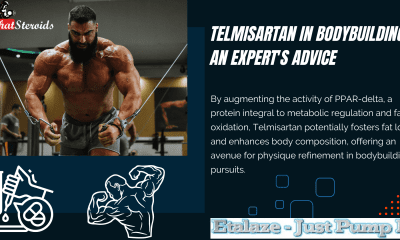
 Bodybuilding Products1 year ago
Bodybuilding Products1 year agoTelmisartan In Bodybuilding: An Expert’s Advice
-
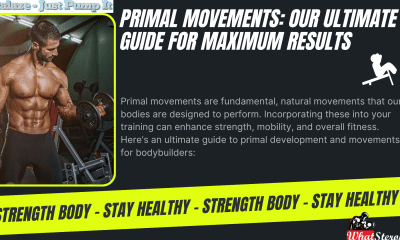
 Bodybuilding8 months ago
Bodybuilding8 months agoPrimal Movements: Our Ultimate Guide for Maximum Results
-

 Bodybuilding1 year ago
Bodybuilding1 year agoChia Seeds in A Bodybuilder’s Diet: An Expert’s Advice
-

 Anabolic Steroids10 months ago
Anabolic Steroids10 months agoJoint Stiffness: How to Manage It While on AAS
-
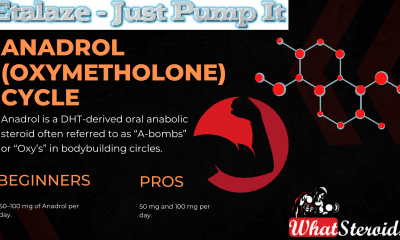
 Steroids1 year ago
Steroids1 year agoAnadrol Cycle: Benefits, Doses, Alternatives, etc.
-
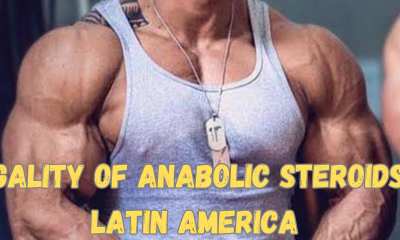
 Anabolic Steroids1 year ago
Anabolic Steroids1 year agoLegality of Anabolic Steroids In Latin America
-

 Beginners2 years ago
Beginners2 years agoTren Cycle for Beginners
-
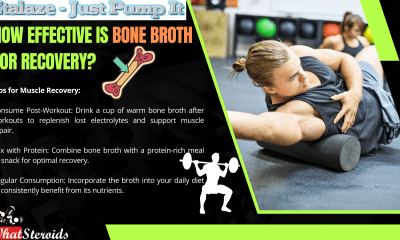
 Bodybuilding9 months ago
Bodybuilding9 months agoHow Effective is Bone Broth for Recovery?
-
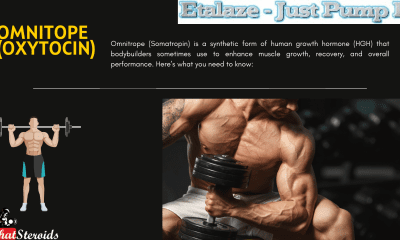
 Steroids10 months ago
Steroids10 months agoOmnitope (Oxytocin)
-

 Bodybuilding1 year ago
Bodybuilding1 year agoHow Much Is Too Much Cardio? Understanding Heart Rate Zones
-
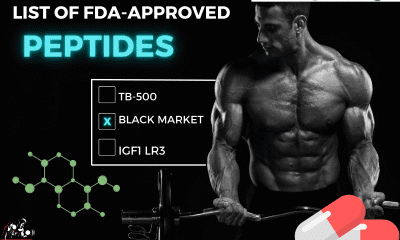
 Bodybuilding1 year ago
Bodybuilding1 year agoList of FDA-Approved Peptides
-

 Steroids9 months ago
Steroids9 months agoSleeping Positions for Effective Muscle Recovery
-

 Bodybuilding2 years ago
Bodybuilding2 years agoCompetition Prep Cycle for Pro Bodybuilders
-

 Bodybuilding1 year ago
Bodybuilding1 year agoCalorie Dumping: A Bodybuilder’s Guide
-
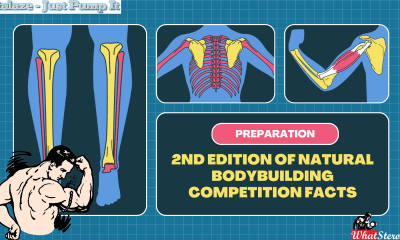
 Bodybuilding8 months ago
Bodybuilding8 months ago2nd Edition of Natural Bodybuilding Competition Facts
-
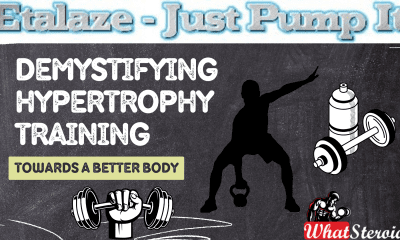
 Bodybuilding1 year ago
Bodybuilding1 year agoDemystifying Hypertrophy Training
-
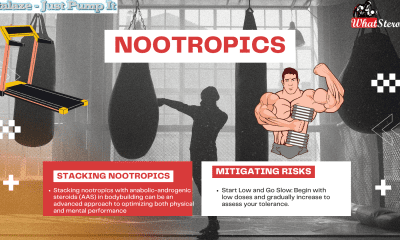
 Bodybuilding9 months ago
Bodybuilding9 months agoAre Nootropics a Better Option to AAS?
-

 Anabolic Steroids12 months ago
Anabolic Steroids12 months agoHow Much Do You Know About B-AET? A Fat Burner You’ve Been Missing
-
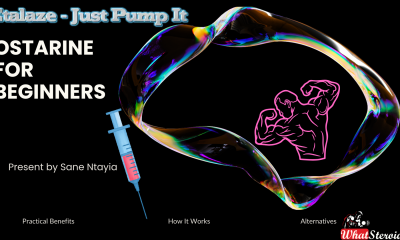
 Steroids4 months ago
Steroids4 months agoOstarine For Beginners: The Ultimate Guide
-

 Product Reviews12 months ago
Product Reviews12 months agoTop Vitamins for Skin Health














